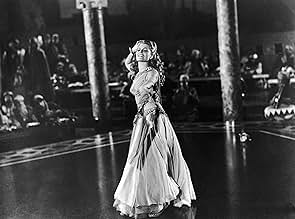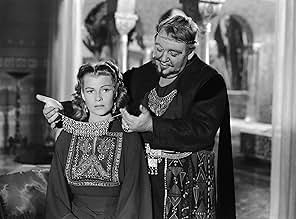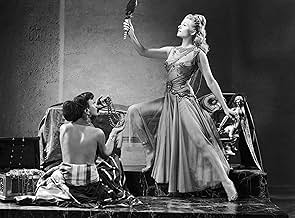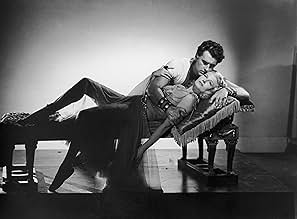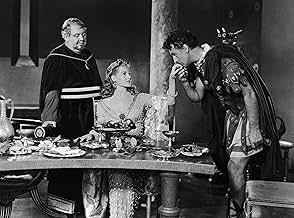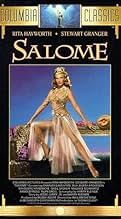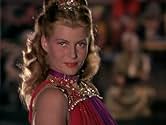AVALIAÇÃO DA IMDb
5,8/10
2,4 mil
SUA AVALIAÇÃO
Adicionar um enredo no seu idiomaAfter her banishment from Rome, Jewish Princess Salome returns to her Roman-ruled native land of Galilee, where prophet John the Baptist preaches against Salome's parents, King Herod and Que... Ler tudoAfter her banishment from Rome, Jewish Princess Salome returns to her Roman-ruled native land of Galilee, where prophet John the Baptist preaches against Salome's parents, King Herod and Queen Herodias.After her banishment from Rome, Jewish Princess Salome returns to her Roman-ruled native land of Galilee, where prophet John the Baptist preaches against Salome's parents, King Herod and Queen Herodias.
- Direção
- Roteiristas
- Artistas
- Prêmios
- 1 indicação no total
Cedric Hardwicke
- Tiberius Caesar
- (as Sir Cedric Hardwicke)
David Ahdar
- Convert
- (não creditado)
Ray Beltram
- Herod's Council Member
- (não creditado)
Bobker Ben Ali
- Politician
- (não creditado)
Frederic Berest
- Sailor
- (não creditado)
Barry Brooks
- Roman Guard
- (não creditado)
Bruce Cameron
- Guard
- (não creditado)
Eduardo Cansino
- Roman Guard
- (não creditado)
Tristram Coffin
- Guard
- (não creditado)
Bud Cokes
- Galilean Soldier
- (não creditado)
Avaliações em destaque
Salome certainly isn't a terrible film, far from it. But I do think, as a biblical epic it is flawed in many ways. The costumes and the scenery were a joy to the eyes, and the music was beautiful and a treat to the ears. The acting is pretty good too, with Stewart Granger handsome in his role, and Judith Anderson deliciously cruel as Herodias, though Anderson to be fair has given better performances in classics like And Then There Were None and Rebecca. Charles Laughton gives one of his career's weakest performances, but he is good as King Herod to some extent. The film's portrayal of John the Baptist from Alan Badel was also fine, but Salome's creme de la creme is Rita Hayworth in the title role. Entirely captivating and so beautiful, and she danced beautifully in Dance of the Seven Veils which also happens to be a scene from Richard Strauss's opera of the same name. However, the film's flaws include pedestrian pacing, an underdeveloped script and a story that suffers from a lot of tampering. Overall, deeply flawed, but watchable biblical film, that is worth watching if only for Hayworth and Dance of the Seven Veils. 6/10 Bethany Cox
Although other films from the same period might be expected to receive a higher priority because they remain more significant today, it seems amazing that this film has never been released as a DVD. Salome is highly viewable, and anyone simply wanting to pass an evening by watching a light entertaining film without regard to its message or social significance would probably find it an excellent choice. Such films are among the most successful in video rental stores or as casual purchases from store displays - consequently they bring in the greatest returns for companies creating new DVD's from old films and are often selected in preference to much more significant works.
What does Salome have going for it?. Firstly a good Technicolor print of the type which provides endlessly enjoyable images of the seas, skies and scenery so plentiful in the Mediterranean. Next a very popular duration of around 100 minutes, a story which is widely known and a one word title equally readily recognised. Thirdly a cast largely composed of great Hollywood stars of the period - a major selling point usually far more important than the filmscript, direction or historical accuracy; and finally an electrifying near striptease performance by a star who has been referred to as the Hollywood love goddess of the period. To set against all this were the very poor reviews by most critics who condemned it for gross overacting, poor dialogue, unimaginative direction and historical inaccuracy - all of which experience suggests is of less importance than the cast for most viewers (even those who study the critics), when they are simply looking for an enjoyable and relaxing evening.
Furthermore some of these criticisms are not easily sustained. 'Overacting' is a qualitative term which first became important when the introduction of talkies in the 1930's made the exaggerated actions and gestures of the silent era no longer necessary. Stage actors are trained to overact so the distant members of their audience seated far away 'up in the gods' can better follow what is going on. Done carefully this type of overacting can be very effective in films with rather melodramatic story lines, and is often referred to as 'chewing up the scenery'. There is a lot of this in Salome, not only from John the Baptist but also from both Herod and Herodias. Watching Charles Laughton, as a very lecherous Herod, lasciviously rolling his eyes and drooling at the mouth when Salome dances is one of the great joys of this film. It is true that Rita Hayworth was probably too old to play a character historically believed to have been so much younger, and she certainly did not look the part of a Semitic princess, but she was trained as a dancer from infancy and it is unlikely that the film would have the same appeal today if any other Hollywood star of the period had been given the role.
Historical inaccuracies are much more controversial. I take a very strong objection to incorrect representations of what is factually established history unless it is made clear that this is being done. Here however historical records seem to be rather limited and not entirely self consistent, so some judgment is called for. Most of what we believe we know about Salome probably comes from records that are more literary than historical. For hundreds of years much current literature comprised re-writing and fleshing out known stories which might have originated as oral history, legend, myth or pure fiction. In this case an additional complication is that the most widely known contemporary reference come from the Bible rather than from a work solely written as history - something that often leads to public reactions based more on emotion than on fact. Herod, Herodias and Herodias's daughter are well authenticated historical characters, but doubts have even been raised as to whether the latter was actually named Salome (some sources refer to her having the same name as her mother). History points to her age at the time as being 13 or 14 but this is by inference rather than definite records. The account of Salome dancing before Herod occupies about 200 words in each of the gospels of Mark and Matthew in the Bible. There is also a brief historical record of this dance and its outcome written by the Roman-Jewish historian Josephus. The story in this film reverses the biblical story which indicates that Salome had no idea what reward to seek from Herod after dancing for him, but at the request of her mother agreed to ask for John's head. The reversal was demanded by a Columbia Studio head who did not want his star tagged with the label of a very bad girl, but historically it can also be found in Jules Massenet's opera "Herodiade". In a film intended purely as a piece of entertainment this reversal would be justifiable artistic licence so long as the change from the normally accepted story was clearly indicated. Since this was not done, the film has been mercilessly but rather unfairly shredded by critics and viewers ever since. Nobody today would view it to learn the story and for those merely seeking an enjoyable evening's viewing, it is inconsequential. If a similar film had depicted a legend about which little was known historically, there would have been much less controversy and, despite all its faults, the film would probably have remained much more highly regarded right up to today (with copies on DVD readily available in almost every video store). Anyone who wishes to view a more structured reconstruction of this story should watch the fine Ken Russell film based on the play by Oscar Wilde (or even Nazimova's 1923 silent film), but for an evening's light, enjoyable entertainment without heavy psychological musings choose this 1953 film.
What does Salome have going for it?. Firstly a good Technicolor print of the type which provides endlessly enjoyable images of the seas, skies and scenery so plentiful in the Mediterranean. Next a very popular duration of around 100 minutes, a story which is widely known and a one word title equally readily recognised. Thirdly a cast largely composed of great Hollywood stars of the period - a major selling point usually far more important than the filmscript, direction or historical accuracy; and finally an electrifying near striptease performance by a star who has been referred to as the Hollywood love goddess of the period. To set against all this were the very poor reviews by most critics who condemned it for gross overacting, poor dialogue, unimaginative direction and historical inaccuracy - all of which experience suggests is of less importance than the cast for most viewers (even those who study the critics), when they are simply looking for an enjoyable and relaxing evening.
Furthermore some of these criticisms are not easily sustained. 'Overacting' is a qualitative term which first became important when the introduction of talkies in the 1930's made the exaggerated actions and gestures of the silent era no longer necessary. Stage actors are trained to overact so the distant members of their audience seated far away 'up in the gods' can better follow what is going on. Done carefully this type of overacting can be very effective in films with rather melodramatic story lines, and is often referred to as 'chewing up the scenery'. There is a lot of this in Salome, not only from John the Baptist but also from both Herod and Herodias. Watching Charles Laughton, as a very lecherous Herod, lasciviously rolling his eyes and drooling at the mouth when Salome dances is one of the great joys of this film. It is true that Rita Hayworth was probably too old to play a character historically believed to have been so much younger, and she certainly did not look the part of a Semitic princess, but she was trained as a dancer from infancy and it is unlikely that the film would have the same appeal today if any other Hollywood star of the period had been given the role.
Historical inaccuracies are much more controversial. I take a very strong objection to incorrect representations of what is factually established history unless it is made clear that this is being done. Here however historical records seem to be rather limited and not entirely self consistent, so some judgment is called for. Most of what we believe we know about Salome probably comes from records that are more literary than historical. For hundreds of years much current literature comprised re-writing and fleshing out known stories which might have originated as oral history, legend, myth or pure fiction. In this case an additional complication is that the most widely known contemporary reference come from the Bible rather than from a work solely written as history - something that often leads to public reactions based more on emotion than on fact. Herod, Herodias and Herodias's daughter are well authenticated historical characters, but doubts have even been raised as to whether the latter was actually named Salome (some sources refer to her having the same name as her mother). History points to her age at the time as being 13 or 14 but this is by inference rather than definite records. The account of Salome dancing before Herod occupies about 200 words in each of the gospels of Mark and Matthew in the Bible. There is also a brief historical record of this dance and its outcome written by the Roman-Jewish historian Josephus. The story in this film reverses the biblical story which indicates that Salome had no idea what reward to seek from Herod after dancing for him, but at the request of her mother agreed to ask for John's head. The reversal was demanded by a Columbia Studio head who did not want his star tagged with the label of a very bad girl, but historically it can also be found in Jules Massenet's opera "Herodiade". In a film intended purely as a piece of entertainment this reversal would be justifiable artistic licence so long as the change from the normally accepted story was clearly indicated. Since this was not done, the film has been mercilessly but rather unfairly shredded by critics and viewers ever since. Nobody today would view it to learn the story and for those merely seeking an enjoyable evening's viewing, it is inconsequential. If a similar film had depicted a legend about which little was known historically, there would have been much less controversy and, despite all its faults, the film would probably have remained much more highly regarded right up to today (with copies on DVD readily available in almost every video store). Anyone who wishes to view a more structured reconstruction of this story should watch the fine Ken Russell film based on the play by Oscar Wilde (or even Nazimova's 1923 silent film), but for an evening's light, enjoyable entertainment without heavy psychological musings choose this 1953 film.
Don't bother watching this film for historical accuracy. Watch it instead for entertainment value only and to see why Rita Hayworth was worshipped as a Goddess.
You can almost feel the debauchery oozing out of Charles Laughton's Herod as he oils his way through the film. And Judith Anderson's Queen Herodias is completely over the top, but you can see where she's coming from and that she's a product of her circumstances. Stewart Granger is almost out of place here as he's the only one not seriously hamming it up, but he still does a relatively convincing job as Commander Claudius, improving as the film progresses.
I love this film for the wonderful elocution-lesson delivery of the dialogue and the gloriously artificial colouring which give a lovely fantasy recreation of biblical times: even though bad things happen, they just don't seem that bad. And even after all these years Rita Hayworth's dancing is a vision to behold for men and women alike.
You can almost feel the debauchery oozing out of Charles Laughton's Herod as he oils his way through the film. And Judith Anderson's Queen Herodias is completely over the top, but you can see where she's coming from and that she's a product of her circumstances. Stewart Granger is almost out of place here as he's the only one not seriously hamming it up, but he still does a relatively convincing job as Commander Claudius, improving as the film progresses.
I love this film for the wonderful elocution-lesson delivery of the dialogue and the gloriously artificial colouring which give a lovely fantasy recreation of biblical times: even though bad things happen, they just don't seem that bad. And even after all these years Rita Hayworth's dancing is a vision to behold for men and women alike.
Banished from Rome by Emperor Tiberius Augustus : Cedric Hardwicke , Salome : Rita Hayworth abandoning her boyfriend : Rex Reason , returns to Jerusalem , there being infatuated by both , a good-looking Roman Centurion : Stewart Granger , and the licentious Herodes : Charles Laughton who is lasciviously after her , while John the Baptist : Alan Badel loses his head .
Spectacular and colorful film , with plenty of some viviv large-scales scenes , certainly , but lacks fidelity to Holy Bible , this is very free and loose rendition based on Ancient Scriptures . Here outstanding Rita Hayworth and her famous dance , as she sinuously shedding her Seven Veils . The best perfomances go to Alan Badel as a fanatic John the Baptist along with Charles Laughton as a lascivious Herodes Antipas and well supported by the usually baddie Judith Anderson as his Queen , Herodias . Including other illustruous secondaries as Sir Cedric Hardwick as emperor Tiberius , Arnold Moss , Maurice Schwarz , Rex Reason, and Basil Sydney as Pontius Pilatos .
It contains a moving and stirring musical score by George Duning , adding some religious and oriental sounds . As well as evocative cinematography in Technicolor by cameraman Charles Lang , though a perfect remastering being really necessary . The picture benefits itself to be shot in location in Israel, though wasted because of no too much exteriors . This Biblic rendition far from faithful to its origin , and according to Columbia Pictures and it was professionally directed by William Dieterle , though it has a few gaps and failures . Dieterle was a good director, making nice films and some masterpieces , as he directed the following ones : "Devil and Daniel Webster" , "Hunchback of Notre Dame" , "Juarez" , "Life of Emile Zola" , "Quick Let's get married" , and his greatest success : "Portrait of Jennie" , among others. Rating : 6/10, acceptable , but neither extraordinary , not notable , but passable . The yarn will appeal to Rita Hayworth , Stewart Granger and Charles Laughton fans .
Spectacular and colorful film , with plenty of some viviv large-scales scenes , certainly , but lacks fidelity to Holy Bible , this is very free and loose rendition based on Ancient Scriptures . Here outstanding Rita Hayworth and her famous dance , as she sinuously shedding her Seven Veils . The best perfomances go to Alan Badel as a fanatic John the Baptist along with Charles Laughton as a lascivious Herodes Antipas and well supported by the usually baddie Judith Anderson as his Queen , Herodias . Including other illustruous secondaries as Sir Cedric Hardwick as emperor Tiberius , Arnold Moss , Maurice Schwarz , Rex Reason, and Basil Sydney as Pontius Pilatos .
It contains a moving and stirring musical score by George Duning , adding some religious and oriental sounds . As well as evocative cinematography in Technicolor by cameraman Charles Lang , though a perfect remastering being really necessary . The picture benefits itself to be shot in location in Israel, though wasted because of no too much exteriors . This Biblic rendition far from faithful to its origin , and according to Columbia Pictures and it was professionally directed by William Dieterle , though it has a few gaps and failures . Dieterle was a good director, making nice films and some masterpieces , as he directed the following ones : "Devil and Daniel Webster" , "Hunchback of Notre Dame" , "Juarez" , "Life of Emile Zola" , "Quick Let's get married" , and his greatest success : "Portrait of Jennie" , among others. Rating : 6/10, acceptable , but neither extraordinary , not notable , but passable . The yarn will appeal to Rita Hayworth , Stewart Granger and Charles Laughton fans .
While this film does vary from the biblical storyline, it's worth watching for Rita alone. She's a vision in all her scenes and very good in her part, culminating in her 'Dance of the Seven Veils', which is a treasure. {I only wish it wasn't montaged with the death of the Baptist.} Rita never looked lovelier than she does here and her Jean Louis costumes are all drop-dead gorgeous. Stewart Granger is pretty good, better than usual, he and Rita having good chemistry here. It's well cast, with actors Charles Laughton and Dame Judith Anderson both excellent as King Herod and Queen Herodias. Arnold Moss is slithering as the evil adviser to Queen Herodias, though Alan Badel as John the Baptist seems more like a wild-eyed madman than a holy prophet. Though there are some filler segments that are not up to the rest of the film, still I think it's excellent entertainment.
Você sabia?
- CuriosidadesThis was the last movie produced by Rita Hayworth's production company, the Beckworth Company. Hayworth later called her "Dance of the Seven Veils" in this movie, "the most demanding of my entire career", and said it required "endless takes and retakes."
- Erros de gravaçãoIn Palestine, Claudius saves Salome from a gila monster, a venomous lizard found only in southwestern North America.
- Citações
Queen Herodias: The desperate can only survive by taking desperate measures.
- Cenas durante ou pós-créditosAt the end of the picture, rather than seeing the words The End on the screen, we see a title that says This was The Beginning.
- ConexõesEdited into Os Três Patetas com Hércules no Olimpo (1962)
Principais escolhas
Faça login para avaliar e ver a lista de recomendações personalizadas
- How long is Salome?Fornecido pela Alexa
Detalhes
- Tempo de duração1 hora 43 minutos
- Proporção
- 1.37 : 1
Contribua para esta página
Sugerir uma alteração ou adicionar conteúdo ausente



